Daily Vocabulary Words: List of Daily Used Words in Leading International Newspapers
Hi there. Welcome to this special section @ Wordpandit.
Our endeavour here is very simple: to highlight important daily vocabulary words, which you would come across in leading newspapers in the country. We have included the following newspapers in our selection:
• The New York Times
• The Washington Post
• Scientific American
• BBC
• The Guardian
• Psychology Today
• Wall Street Journal
• The Economist
We are putting in extensive work for developing your vocabulary. All you have got to do is be regular with this section and check out this post on a daily basis. This is your repository of words that are commonly used and essentially, we are posting a list of daily used words. Hence, this has significant practical application as it teaches you words that are used commonly in leading publications mentioned above.
Visit the website daily to learn words from leading international newspapers.
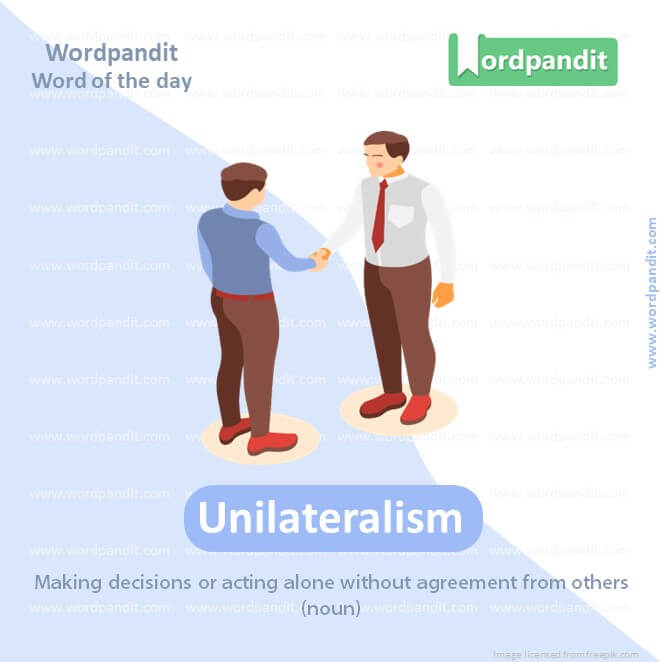
WORD-1: Unilateralism
CONTEXT: Critics of the recent policy changes in Washington Post argue that such unilateralism could undermine international cooperation on climate change.
SOURCE: Washington post
EXPLANATORY PARAGRAPH: Imagine if you wanted to play a game, but instead of asking everyone to join in and decide the rules together, you just decided to play by your own rules alone. That’s a bit like unilateralism. It’s when a country or group makes decisions just by themselves without waiting for others to agree.
MEANING: Making decisions or acting alone without agreement from others (noun).
PRONUNCIATION: yooniLATeralism.
SYNONYMS: Independence, autonomy, self-determination, self-governance, sovereignty, self-sufficiency.
USAGE EXAMPLES:
1. The country’s unilateralism led to tensions with its neighbors.
2. Many were critical of the leader’s unilateralism on the trade decision.
3. Unilateralism can sometimes lead to misunderstandings.
4. The community was upset by the mayor’s unilateralism regarding the park’s future.
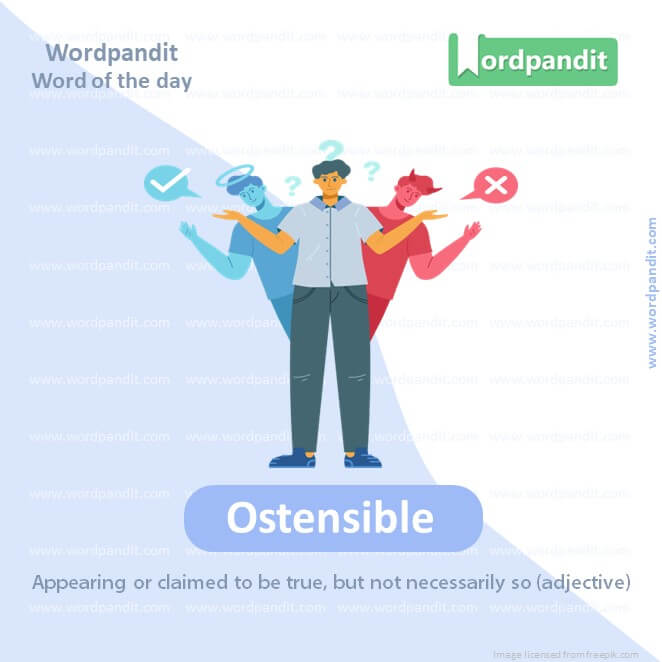
WORD-2: Ostensible
CONTEXT: the ostensible reason for the military deployment was humanitarian aid, but many believe that strategic interests are the real motive.
SOURCE: New York Times
EXPLANATORY PARAGRAPH: Imagine you see a big box wrapped in a gift paper and you think there’s a toy inside, but when you open it, there’s just a book. The reason you thought there was a toy is because it looked like it from the outside. “Ostensible” is a fancy word for something that seems to be true or real but might not be.
MEANING: Appearing or claimed to be true, but not necessarily so (adjective).
PRONUNCIATION: osTENsibul.
SYNONYMS: Apparent, seeming, outward, superficial, purported, alleged.
USAGE EXAMPLES:
1. His ostensible reason for visiting was to see his aunt, but he was really there for the town’s festival.
2. The ostensible purpose of the meeting was unclear.
3. She made an ostensible effort to help.
4. The film’s ostensible theme is friendship, but it also touches on deeper issues.
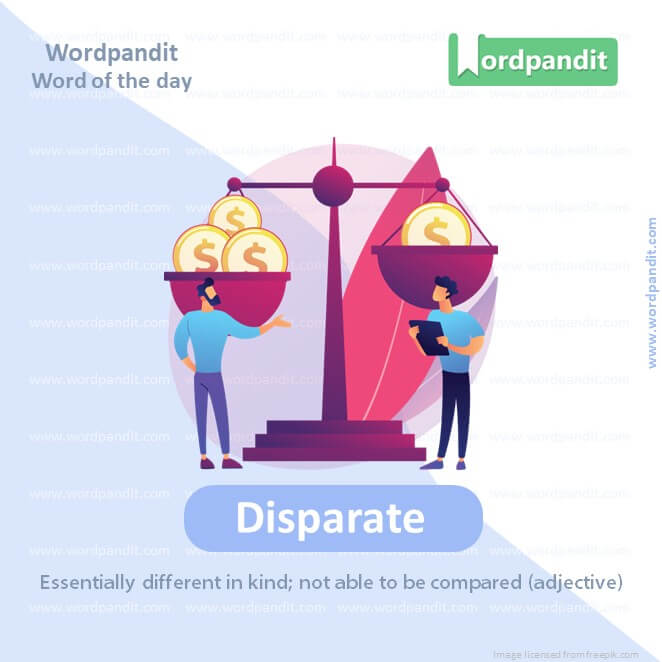
WORD-3: Disparate
CONTEXT: ran a piece on the disparate impact of global economic policies, showing how the rich and poor nations are affected differently.
SOURCE: al Jazeera
EXPLANATORY PARAGRAPH: Imagine you have a box of crayons and a box of cookies. They’re very different from each other, right? “Disparate” is a word we use when we’re talking about things that are really different from each other.
MEANING: Essentially different in kind; not able to be compared (adjective).
PRONUNCIATION: DISpuhrat.
SYNONYMS: Diverse, distinct, dissimilar, varied, contrasting, different.
USAGE EXAMPLES:
1. The two authors have disparate writing styles.
2. The country is a mix of disparate cultures and traditions.
3. We need to bring these disparate groups together for a common cause.
4. Their opinions on the matter were disparate.
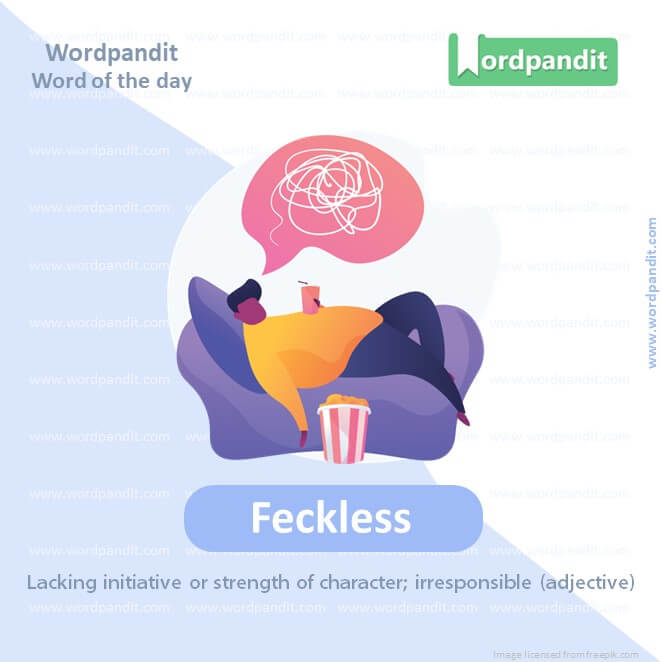
WORD-4: Feckless
CONTEXT: the international community for its feckless response to the ongoing refugee crisis.
SOURCE: guardian
EXPLANATORY PARAGRAPH: Imagine if someone was given a task to build a sandcastle but they just played around and let the water wash it away. “Feckless” describes someone who isn’t very responsible or effective in what they do.
MEANING: Lacking initiative or strength of character; irresponsible (adjective).
PRONUNCIATION: FEKlus.
SYNONYMS: Ineffective, useless, incompetent, inept, careless, thoughtless.
USAGE EXAMPLES:
1. The feckless student forgot his homework three days in a row.
2. Many criticized the leader for his feckless approach to the crisis.
3. She was tired of her brother’s feckless behavior.
4. The company’s feckless management led to its downfall.
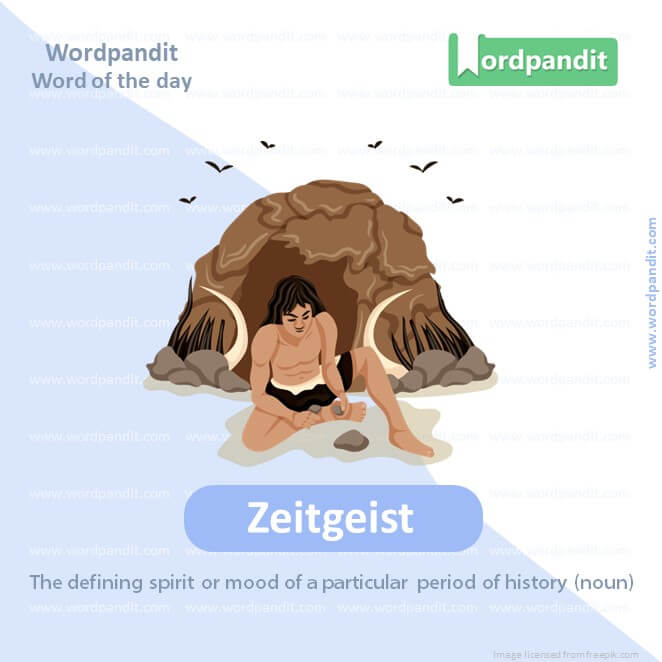
WORD-5: Zeitgeist
CONTEXT: how current pop culture reflects the zeitgeist of an era marked by social and political upheaval.
SOURCE: al Jazeera
EXPLANATORY PARAGRAPH: Think of all the popular things that everyone is talking about or doing right now, like a popular dance or song. “Zeitgeist” is a word that describes the mood or spirit of a certain time, especially what’s popular or trendy.
MEANING: The defining spirit or mood of a particular period of history (noun).
PRONUNCIATION: ZITEguyst.
SYNONYMS: Spirit of the age, mood of the era, cultural climate, general trend, atmosphere.
USAGE EXAMPLES:
1. The movie perfectly captures the zeitgeist of the 1980s.
2. Social media has become a major part of the modern zeitgeist.
3. Many artists reflect the zeitgeist of their generation in their work.
4. The fashion show displayed clothes that were very much in line with today’s zeitgeist.
WORD-6: Recalcitrant
CONTEXT: the challenges faced by global leaders in trying to negotiate with recalcitrant regimes that refuse to comply with international norms.
SOURCE: al Jazeera
EXPLANATORY PARAGRAPH: Imagine trying to get a stubborn mule to move when it doesn’t want to. “Recalcitrant” describes someone or something that is really stubborn and doesn’t want to obey or agree.
MEANING: Having an obstinate attitude towards authority or discipline (adjective).
PRONUNCIATION: reKALsitrant.
SYNONYMS: Stubborn, obstinate, uncooperative, resistant, defiant.
USAGE EXAMPLES:
1. The teacher had difficulty managing the recalcitrant student.
2. She was recalcitrant and refused to follow the new rules.
3. The government faced recalcitrant opposition groups.
4. Training the recalcitrant puppy required a lot of patience.
WORD-7: Exigent
CONTEXT: the exigent circumstances surrounding the natural disaster, emphasizing the urgent need for international aid.
SOURCE: guardian
EXPLANATORY PARAGRAPH: Imagine you’re in a car and suddenly you realize you’re running out of gas. You need to find a gas station quickly! “Exigent” describes situations that need quick action or attention.
MEANING: Requiring immediate action or attention (adjective).
PRONUNCIATION: EXijent.
SYNONYMS: Urgent, pressing, critical, crucial, imperative, immediate.
USAGE EXAMPLES:
1. The patient’s condition was exigent, demanding immediate surgery.
2. The team faced an exigent deadline to finish the project.
3. Due to the storm, there was an exigent need for shelter.
4. The company had to respond to the exigent market changes.
WORD-8: Proclivity
CONTEXT: the leader delved into his proclivity for unpredictable behavior, which has made diplomatic relations challenging.
SOURCE: Washington post
EXPLANATORY PARAGRAPH: Think about your favorite ice cream flavor. Every time you visit an ice cream shop, you might choose that flavor because you like it so much. “Proclivity” is a fancy word for a strong liking or tendency towards something.
MEANING: A strong inclination or preference towards something (noun).
PRONUNCIATION: proKLIVitee.
SYNONYMS: Inclination, tendency, penchant, predisposition, leaning, bias.
USAGE EXAMPLES:
1. She has a proclivity for vintage clothing.
2. His proclivity towards procrastination often got him in trouble.
3. Young children often show a proclivity for learning languages quickly.
4. The artist’s proclivity for bright colors is evident in all his paintings.
WORD-9: Insouciance
CONTEXT: the summit noted the insouciance of some leaders towards pressing global issues, contrasting it with the urgency felt by activists.
SOURCE: al Jazeera
EXPLANATORY PARAGRAPH: Have you ever seen someone without a care in the world, just humming a tune or skipping around? That person is showing “insouciance.” It’s a way of being carefree and not worried about anything.
MEANING: Casual lack of concern or indifference (noun).
PRONUNCIATION: inSOOseeans.
SYNONYMS: Nonchalance, unconcern, indifference, carefreeness, lightheartedness.
USAGE EXAMPLES:
1. Her insouciance about her exams surprised everyone.
2. Despite the chaos, he strolled in with complete insouciance.
3. The cat’s insouciance was evident as it lounged in the sun.
4. Some mistook his insouciance for arrogance, but he was just naturally carefree.
WORD-10: Hegemony
CONTEXT: the waning American hegemony in global politics and the potential implications for Europe.
SOURCE: New York Times
EXPLANATORY PARAGRAPH: Imagine if in a group of friends, one friend always decides what games to play or where to go. That friend has a lot of control or influence over the group. “Hegemony” is when one group or country has a lot of power or control over others.
MEANING: Dominance or control by one group or state over others (noun).
PRONUNCIATION: hehJEHmonee.
SYNONYMS: Dominance, supremacy, authority, control, command, sway.
USAGE EXAMPLES:
1. The empire extended its hegemony over the neighboring kingdoms.
2. The company’s hegemony in the industry was challenged by new startups.
3. Critics were concerned about the media conglomerate’s growing hegemony.
4. The region witnessed several battles for hegemony between rival factions.
Vocabulary Meaning
In the ocean of language learning, ‘vocabulary meaning’ is akin to the colorful coral reefs that add depth and vibrancy to communication. Yet, infusing our interactions with this vibrancy is often a challenge for many language learners. The crux lies in effectively deciphering and employing the ‘vocabulary meaning’.
Learning ‘vocabulary meaning’ isn’t about merely gluing words to their definitions. It’s about forming a deep understanding and connection with these words that transcends rote learning. To gain a comprehensive grasp of ‘vocabulary meaning’, one needs to navigate beyond textbook definitions and commit to exploiting diversified resources such as novels, films, music, articles, and digital content. This allows one to encounter vocabulary in a variety of contexts and actual usage, giving deeper insight into their meaning.
However, understanding ‘vocabulary meaning’ involves another essential aspect—memory retention. Techniques such as spaced repetition and the Leitner System offer effective methodologies to maintain and consolidate the ‘vocabulary meaning’. Additionally, leveraging mnemonic strategies can help etch words into your memory by linking them with unique stories or imagery that are personal and easily recallable.
Another way of mastering ‘vocabulary meaning’ is by immersing yourself in the language. Engage in regular conversations with native speakers if possible or utilize language exchange platforms to practice your skills. This not only bolsters your understanding of how the vocabulary is used but also helps articulate the ‘vocabulary meaning’ in the societal and cultural contexts.
In conclusion, gaining a robust grasp of ‘vocabulary meaning’ is a journey rather than an end goal. It requires dedication, perseverance and most importantly, a multi-faceted approach that includes diversified resources, effective memory strategies, and real-life application. With these strategies in place, the depths of ‘vocabulary meaning’ are no longer daunting but become an enchanting exploration of language.







